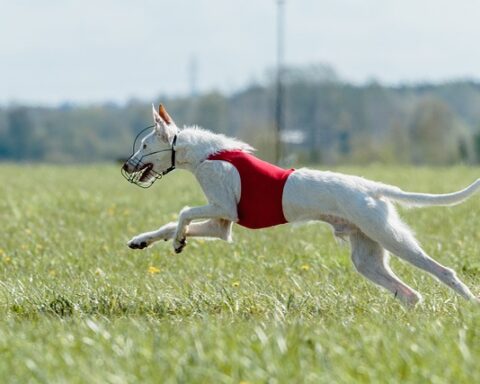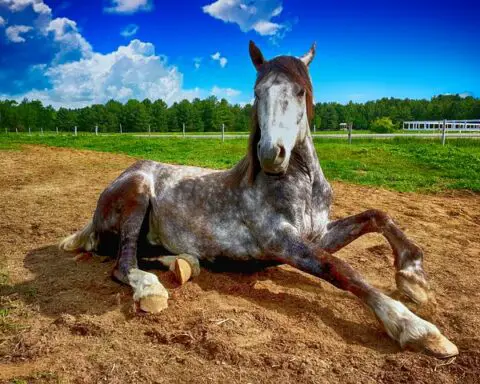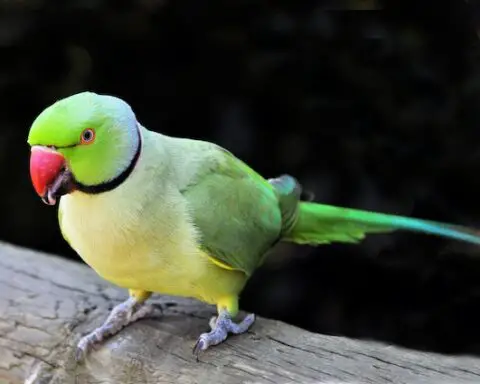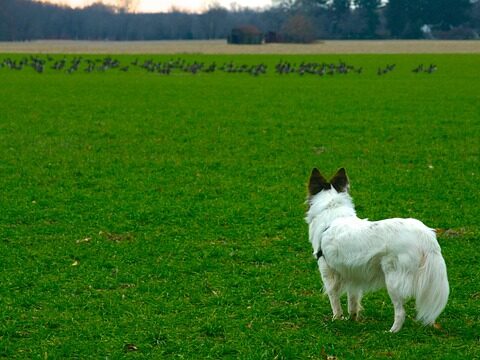We’ve all looked down from the dinner table to see that adorable little cat face staring up at us. The expression that tells you that they have not been fed in forever, that their life is impossibly difficult, and a piece of your chicken is frankly the difference between life and death. We’ve also all had to fish our cats out of the bin to get them away from that can of tuna, we’ve seen them eat grass, and we’ve had the privilege of trying to figure out what to do with the half-eaten mouse on the kitchen floor while our kitty chomps down on the missing pieces.
Cats are wonderful enigmas, each and every one, but no matter what their eyes tell you and however much they might yowl at you for ignoring them while you’re cooking your breakfast, feeding them a healthy, nutritious diet is vitally important to keeping them happy and healthy.
Read: Can a Praying Mantis Kill Snake?
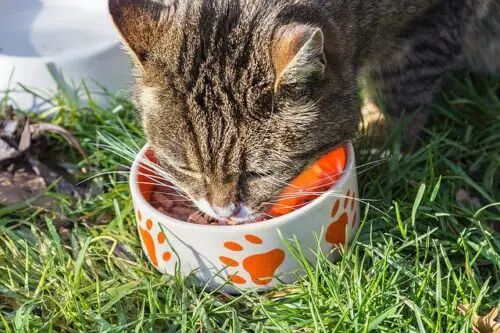
You can’t trust your cat to tell you what they’ve been eating outside your home and you definitely can’t trust them to tell you that they’ve had enough to eat for the day, but something you can do is learn a little bit more about what you’re feeding them and what they’re feeding themselves. Let’s have a closer look at what your cat is eating and how it affects them.
Cats Are Carnivores
In case the way your cat stares out of the kitchen window at those pigeons and squirrels isn’t a giveaway, cats are meat-eaters by nature, or “obligate carnivores”. Their system needs animal source proteins to function properly, and while some of the proteins they require can come from vegetable and plant sources, meat does need to be on the menu.
The main reason for this is that cats require taurine, an amino acid that is only found in meat and animal sources like milk. Their systems and metabolisms are not well suited to a plant-based diet, and any attempt to wean them onto a vegan diet can lead to heart issues and blindness.
Cats Are Extremely Fussy
If you have a cat, you will have seen what happens when you try a new brand of food. There’s the look, the sniff, and then the dismissal. Their displeasure is not always easy to predict, they could be ignoring the most luxurious premium brand or an option that claims to be healthier than what you usually give them, but trying to convince your cat to just try something other than the thing they know they like (this week) can be an uphill struggle.
However, it’s important to note that it’s not always about the food that you’re giving them. Fussy eating in cats can be caused by a number of external factors, ranging from a bowl that hasn’t been properly cleaned to too many people in the room. Cats are very private creatures and unless they’re very comfortable with you, they won’t want to be petted and fussed over while they’re eating. They will want their bowl to be in the same place it usually is so try not to move it too often. It’s also worth noting that some cats prefer to drink water when it’s from a running source rather than a bowl, and they much prefer a ceramic, metal or glass bowl to a plastic one.
Temperature Is Important
It’s most convenient to keep an open container of cat food in the fridge, but you should note that cats are going to say no to anything that’s too cold. The main reason for this is that food which is too cold loses its scent, and that will put your cat right off. What they really want is food that’s roughly the same as their body temperature, because of those hunting instincts. You’ll find that some cats are pickier about this than others, but in general try to avoid giving anything that’s too hot or too cold.
What Goes In The Food?
You will no doubt have noticed the difference in ingredients as you go down the pet food aisle, ranging from opulent combinations of fish and game to the more suspect sounding “meat flavoured” cheaper options. There are all kinds of nasty bits and pieces that can end up in pet food as companies try and cut corners while bulking out their product, so it is really important to read the label and know what you’re giving to your furry friend.
As we mentioned, meat is a vital part of a cat’s diet, and more and more owners are making the switch to a raw diet. This cuts out all the fillers and processed proteins that can have a nasty effect on their digestive system and allows them to absorb those amino acids and natural proteins more easily. Raw cat food UK companies like Bella & Duke offer a range of raw cat foods and broths, which lead to better joint protection, a glossier coat and healthier skin, with improved digestion and dental health. You’ll be able to see the difference in their poo, with smaller, firmer droppings a clear sign that all is working nicely.
Routine Is Important
As unpredictable as your cat can be, we’re also willing to bet that they’re a creature of habit. It’s very important for cats to feel like they’re in control of their surroundings and a change in routine, or unpredictable behaviour on your part, makes that a lot more difficult. If you want to take charge of what your cat is eating and when, make sure to establish a regular feeding routine both in terms of the amount you’re giving it to them and when.
Which brings us to the question of frequency. Contrary to what your grandmother might think, you should not be feeding a cat whenever it asks. Although a kitten is small in size, its energy output is massive, so they need to be fed in small amounts at regular intervals. Their food should be checked and replaced about four times a day. Once your cat hits the one year mark, things can start to change. Twice a day is about right for an adult cat, but remember that you can leave their food out for them, particularly with dry food, as some cats do regurgitate their meals. Once they’ve passed the age of eight, you should start talking to your vet about what you’re feeding them and when. Elderly cats will have specific needs and dietary requirements that may mean a change in routine.
They Will Eat Grass
If cats are carnivores who need meat for a healthy digestive system, then why are they so partial to munching on the garden lawn? Well, for starters, it’s often to a reaction to an upset tummy. Cats don’t have the enzymes they need to digest grass properly so it won’t be long before it goes back out the way it came in, helping them to regurgitate anything that was causing them discomfort. This might be a hairball, or a part of a small animal they’ve caught but couldn’t process properly. Grass is also a source of folic acid which aids with the digestion, among other things, and can also help break things down in the digestive tract, working as a natural laxative.

